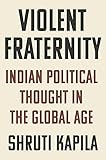Violent Fraternity : Indian Political Thought in the Global Age / Shruti Kapila.
Material type: TextPublisher: Princeton, NJ : Princeton University Press, [2021]Copyright date: ©2021Description: 1 online resource (328 p.)Content type:
TextPublisher: Princeton, NJ : Princeton University Press, [2021]Copyright date: ©2021Description: 1 online resource (328 p.)Content type: - 9780691215754
- Political science -- India -- History -- 20th century
- Political violence -- India
- HISTORY / Asia / India & South Asia
- Alain Badiou
- Ananya Vajpeyi
- BJP
- Bharatiya Janata Party
- Cambridge political thought
- Carl Schmitt
- From the Ruins of Empire
- Ghadar
- Hannah Arendt
- Indian National Congress
- Indian democracy
- Indian history
- Indian political history
- Indian political thinkers
- Indian political thought
- Indian politics
- Modi
- Narendra Modi
- Pankaj Mishra
- Righteous Republic
- Slavoj Zizek
- South Asia
- global intellectual history
- partition
- political Islam
- political theology
- political thought
- republicanism
- sedition
- sovereignty
- 954.04 23
- online - DeGruyter
| Item type | Current library | Call number | URL | Status | Notes | Barcode | |
|---|---|---|---|---|---|---|---|
 eBook
eBook
|
Biblioteca "Angelicum" Pont. Univ. S.Tommaso d'Aquino Nuvola online | online - DeGruyter (Browse shelf(Opens below)) | Online access | Not for loan (Accesso limitato) | Accesso per gli utenti autorizzati / Access for authorized users | (dgr)9780691215754 |
Browsing Biblioteca "Angelicum" Pont. Univ. S.Tommaso d'Aquino shelves, Shelving location: Nuvola online Close shelf browser (Hides shelf browser)

|

|

|

|

|

|

|
||
| online - DeGruyter The Spirit of Green : The Economics of Collisions and Contagions in a Crowded World / | online - DeGruyter Turkish Kaleidoscope : Fractured Lives in a Time of Violence / | online - DeGruyter The Fetters of Rhyme : Liberty and Poetic Form in Early Modern England / | online - DeGruyter Violent Fraternity : Indian Political Thought in the Global Age / | online - DeGruyter Dreams in Late Antiquity : Studies in the Imagination of a Culture / | online - DeGruyter From Duty to Desire : Remaking Families in a Spanish Village / | online - DeGruyter Buddhist Learning and Textual Practice in Eighteenth-Century Lankan Monastic Culture / |
Frontmatter -- Contents -- Introduction -- 1 Political Theology of Sedition -- 2 Ghadar! violence and the political potential of the planet -- 3 Hindutva’s War and the Battlefield of India -- 4 Gandhi and the Truth of Violence -- 5 The Triumph of Fraternity: Sovereign Violence and Pakistan as Peace -- 6 The Philosophical Discovery of Muslim Sovereignty -- 7 A People’s War: 1947, Civil War and the Rise of Republican Sovereignty -- Epilogue -- Acknowledgements -- Bibliography -- Index
restricted access online access with authorization star
http://purl.org/coar/access_right/c_16ec
A groundbreaking history of the political ideas that made modern IndiaViolent Fraternity in the Indian Age is a major history of the political thought that laid the foundations of modern India. Taking readers from the dawn of the twentieth century to the independence of India and formation of Pakistan in 1947, the book is a testament to the power of ideas to drive historical transformation.Shruti Kapila sheds new light on leading figures such as M. K. Gandhi, Muhammad Iqbal, B. R. Ambedkar, and Vinayak Savarkar, the founder of Hindutva, showing how they were innovative political thinkers as well as influential political actors. She also examines lesser-known figures who contributed to the making of a new canon of political thought, such as B. G. Tilak, considered by Lenin to be the "fountainhead of revolution in Asia," and Sardar Patel, India's first deputy prime minister. Kapila argues that it was in India that modern political languages were remade through a revolution that defied fidelity to any exclusive ideology. The book shows how the foundational questions of politics were addressed in the shadow of imperialism to create both a sovereign India and the world's first avowedly Muslim nation, Pakistan. Fraternity was lost only to be found again in violence as the Indian age signaled the emergence of intimate enmity.A compelling work of scholarship, Violent Fraternity in the Indian Age demonstrates why India, with its breathtaking scale and diversity, redefined the nature of political violence for the modern global era.
Mode of access: Internet via World Wide Web.
In English.
Description based on online resource; title from PDF title page (publisher's Web site, viewed 01. Dez 2022)


